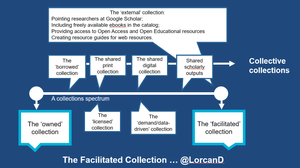The Research Information Network in the UK has released a timely report: Creating catalogues: bibliographic records in a networked world [Splash page; pdf]. It is concise and has a useful Summary and Key Findings section.
I found it an interesting read, in no small part because it rehearses various key themes of these pages. Critically, it discusses systemwide reconfiguration of library services, a far-reaching and critical issue for libraries in a network environment.
There are two overarching issues. One is that library processes are inefficient because resources are consumed in redundant activity that do not create distinctive local value. The second is that a fragmented presence on the web reduces impact and visibility. Of course each of these is related to the institutional-scale nature of much current work, which is poorly aligned with emerging network organization, where we have become accustomed to institutions externalizing activities. The network allows routine work to be consolidated (think payroll) and it favors concentrated user hubs (think Amazon and Google).
So, from a processing point of view it is not surprising to see recommendations which point to better sharing of the burden of data creation across the book/journal world and between libraries (and in this context, there is a discussion of record re-use and innovation). And from an impact point of view, there are recommendations about consolidating the web presence of libraries in order to better focus user attention.
Perhaps the recommendation which will receive the most attention is the following:
Libraries are therefore spending significant resources in editing the records they receive, as well as adding data to meet their own local needs. Sustaining and developing individual catalogues for the more than 160 university libraries in the UK demands considerable resources. A shared catalogue for the whole UK higher education (HE) sector, with dynamic links to local holdings, could bring enormous benefits, in terms of reduced costs, of a more comprehensive coverage of both national and local holdings with better-quality records. It would also provide the potential for developing new user-focused services allowing them to remain relevant to their users and to compete with Amazon, Google and others.
I guess I would not emphasise competition in this way, as one of the functions of such a concentration (noted elsewhere in the report) would be to act as a switch and syndication point on the network.
The report has sensible recommendations about better provision of e-book data; it argues for better dissemination of article level data; and it supports various consensus making activities. I was surprised not to see more discussion of knowledgebase/ERM activity, although this may have been out of scope. This is especially because this is also an area with some potential for consolidation and network concentration.
I will watch with interest how this report is received and discussed. I think that it is inevitable that libraries will externalize more of what they do to third parties and shared services. This is both to increase efficiency and to increase impact. This does not remove the local role, rather it represents a natural evolution in which time and attention can be devoted to changing local needs and interests.
Update: The report does not provide a blueprint for action. It does put a stake in the ground which may shift the conversation.



